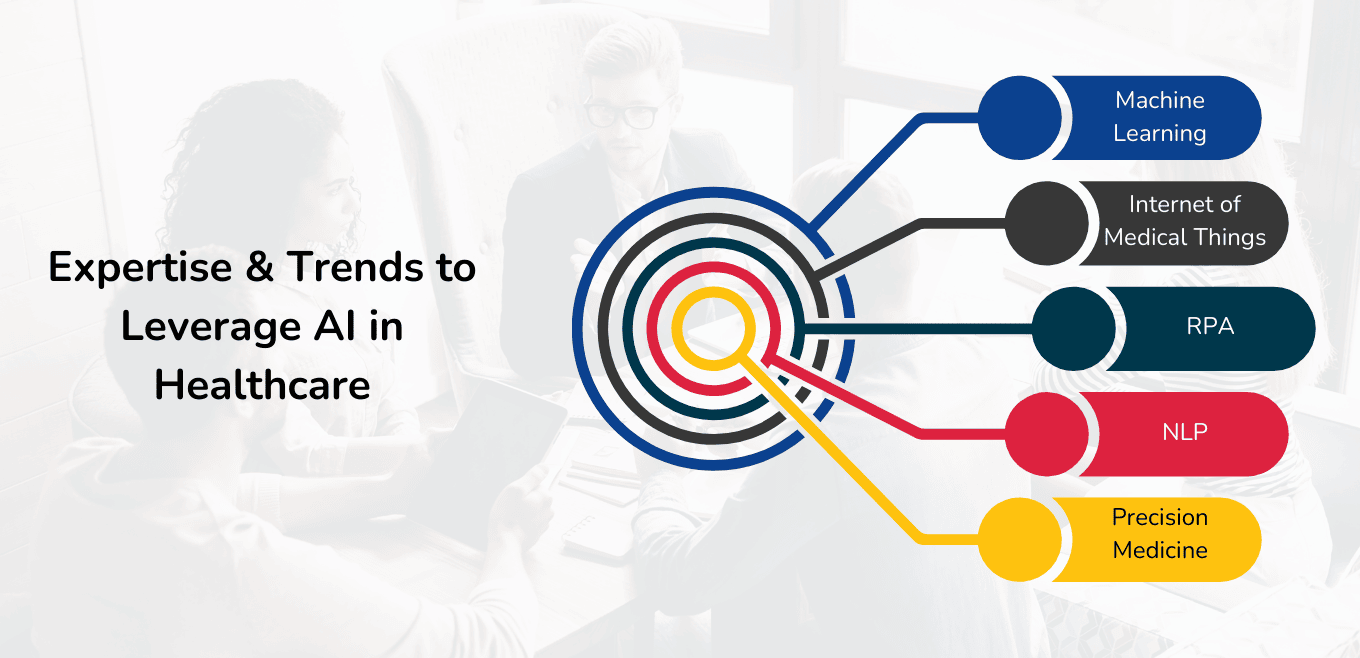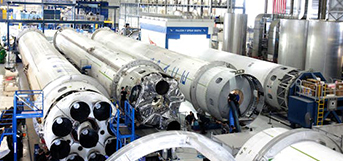The increase in digital technology and reliance on data in the healthcare industry presents impressive use of AI in healthcare. According to a survey, over 40% of healthcare industry partners use AI in healthcare. The market is worth billions of dollars and is expected to expand rapidly in the future.
But with AI in the healthcare industry offering transformative services, tables turn around and errors are gradually reduced. This blog is for healthcare entrepreneurs ready to ditch legacy-based systems and implement AI-backed flawless solutions for your healthcare needs.
How can Al in Healthcare Improve Patient Care- Benefits of AI
The healthcare sector has been redefined and empowered with value-added resources thanks to artificial intelligence. We can better understand how integrating artificial intelligence into healthcare will transform the industry by investigating AI application cases.
Numerous uses of AI in healthcare are revolutionizing medical research, patient treatment, and healthcare administration. Before making a choice, you should be aware of the following applications of AI in healthcare.
1. Digital health monitoring
Allow your patients to sleep in their own homes and facilitate online consultations with medical professionals. This refers to developing a broad range of AI-based healthcare use cases, such as wearable technology, patient-engagement chatbots, virtual nurses, appointment schedulers, RPM systems with EHRs, HIPAA-compliant telemedicine software, and mobile apps for patients and healthcare professionals.
2. End-to-end clinical solutions
To develop different healthcare-related end-to-end solutions, like clinical trial management systems, electronic data capture systems, and patient interaction tools, you could need AI specialists in the healthcare industry. For precise eConsent, telehealth, patient monitoring, and clinical trial data analysis, rely on our AI developers.
3. Drug discovery
According to Statista, over 272 billion dollars will be spent globally on research and development for new drugs in 2024. Thus, the time has come to invest in clinical trial management, analysis, AI-powered drug discovery platforms, and specialized software.
4. Medical solutions
You must begin developing healthcare AI-focused solutions. Based on a patient’s genetics, lifestyle, and preferences, AI assists medical professionals in developing personalized medical treatments or diagnoses.
5. Software for image analysis
Software for image analysis is another application of artificial intelligence in healthcare that requires the highest level of accuracy and focus. AI programmers with excellent training and demonstrated experience can create faultless, accurate medical picture analysis software. We can assist you in creating AI software for radiologists and other medical professionals to use in illness diagnosis and treatment planning.
6. Forecasting medical conditions
The development of medical condition prediction devices is another application of AI in healthcare. Medical condition forecasting is becoming a reality because to artificial intelligence. This fascinating topic analyzes enormous volumes of medical data using AI algorithms to find trends that can be used to forecast the chance of contracting specific diseases.
7. Robotic-assisted surgery
Do you want to create a robotically assisted surgery system for your hospital that is powered by AI? However, you must first understand the potential of Artificial intelligence, including its application to safer and more inventive medical procedures, robotic movement control systems, surgeon interface design and development, and imaging data integration.
8. Personalized care
Even AI-powered systems that offer individualized cures, diagnoses, and treatments without adverse consequences can be created. Furthermore, we are highly skilled in creating personalized real-time medical suggestions 24/7.
9. Genomic data analysis
Since the enormous quantity of information contained in our DNA holds enormous promise for individualized medicine, this Artificial intelligence application for healthcare introduces innovation to the industry. In medicine, artificial intelligence can evaluate intricate genomic data to find genetic variants linked to certain illnesses, enabling faster diagnosis, risk assessment, and the creation of more specialized treatments.
10. Clinical trials optimization
Although they can be costly and time-consuming, clinical trials are essential to the discovery of new drugs. AI in healthcare can analyze huge datasets to find the most promising candidates for clinical trials, optimize trial design, and anticipate patient reactions, leading to a more efficient and successful drug development process.
11. Chronic disease management
Artificial intelligence can evaluate patient information, such as prescriptions, lifestyle choices, and medical history, to anticipate and stop complications in patients with chronic conditions like diabetes or heart disease. This empowers patients to take proactive steps in managing their health and allows healthcare providers to deliver more personalized and preventative care.
Access Exclusive Insights on AI in Healthcare
Don’t miss out! Get tailored AI consulting services with our AI specialists and gain valuable insights on leveraging AI for your practice.
Challenges and Solutions for AI and ML Implementation
Data security
Unauthorized access to consumer or patient data is one of the most significant problems associated with the use of AI in healthcare settings. Information from health records is considered sensitive data and needs further protection. Large data sets are ideal for AI and ML technologies, but the absence of information makes it challenging to create effective techniques for precise diagnosis.
AI-related uncertainties
By identifying diseases early on, AI has undoubtedly had a significant impact on the medical industry. This raised questions about the application of AI to routine healthcare procedures.
Training resources for the integration of AI and ML
The absence of technical training for stakeholders is a major barrier to the use of AI in healthcare. Healthcare workers need to be aware of how AI is used in different care units. But AI technologies could be hard to understand. Offering specialized training to various resources is challenging.
Lack of a framework for execution
Few studies have been conducted on the implementation of AI in healthcare, despite the abundance of research on how AI may change the medical industry. Patients, healthcare professionals, and executives are not very aware of it.
A lot of individuals don’t know how AI can be incorporated into the systems and processes used in healthcare today. Healthcare practitioners must have a strong framework in place to effectively integrate AI into their practice to address this.
Ethical issues
In the medical industry, accountability is crucial. Since artificial intelligence trains itself based on the input data provided, we don’t fully comprehend how it generates results. When an incorrect diagnosis leads to an unfavorable consequence, it might be difficult to assign blame.
Furthermore, it is challenging to assign culpability because there is no universal ethical framework or set of rules for the use of AI in healthcare.
Expertise & Trends to Leverage AI in Healthcare

Investigate each AI technology to find which one works best for your healthcare project, then share it with us to get started quickly.
Machine Learning
Through the analysis of a multitude of data, including wearables, EHRs, EMRs, and more, ML in healthcare algorithms is revolutionizing the healthcare industry. AI may use this data to predict illness risk, improve diagnostic accuracy, tailor patient care, and implement patient monitoring. Employ machine learning developers to implement algorithms for your current healthcare initiatives or create a brand-new one from the ground up.
Internet of Medical Things
A new era of data-driven insights is made possible by AI in healthcare. AI can forecast illness risks, improve diagnosis, tailor treatments, and facilitate ongoing patient monitoring by evaluating large datasets. This corresponds to preventative care, tailored approaches, and better health outcomes.
Robotic Processes Automation
Robotic Process Automation (RPA) addresses the often-overlooked load of administrative procedures, while AI addresses complicated healthcare concerns. RPA is a digital workforce that can help healthcare workers by automating repetitive, rule-based tasks. RPA is dependable for data analysis and reporting, insurance claim processing, medical record maintenance, and appointment scheduling.
Natural Language Processing (NLP)
Electronic health records (EHRs) include enormous amounts of data that provide a plethora of information. However, information frequently appears in unstructured formats such as pathology reports, discharge summaries, and doctor’s notes. Natural language processing can help with this. NLP is an area of artificial intelligence that enables computers to comprehend and process human language. NLP is a potent technique in the healthcare industry to reveal the insights concealed within these text-based records.
Precision Medicine
To assess the risk of a disease and adjust treatment regimens, artificial intelligence makes sure that a patient’s medical history, genetics, and lifestyle factors are evaluated. This will lead to better patient outcomes and more effective therapy. To find out how we can contribute to the development of precision medicine solutions, get in touch with us.
Choosing the Right AI ML Healthcare Development Company
1. Proficiency in any field
Examining an AI & ML development company’s degree of expertise and experience in the field is essential when evaluating them. Select one that employs highly skilled professionals with a wealth of knowledge in AI and machine learning development.
2. Track record
An outstanding reputation and a proven track record are essential for a good AI and ML development company. Employ someone who consistently satisfies client needs, provides excellent solutions, and ensures customer satisfaction. Positive comments and assessments from happy customers support their claim of proficiency in AI and ML development.
3. Customized solutions
It’s crucial to pick an AI ML development company that can provide custom solutions to match your unique business requirements.
4. Concentrate on quality assurance
When developing AI and machine learning, quality is crucial, particularly when it comes to the accuracy, reliability, and usefulness of the solutions. The organization must have robust quality control procedures, conduct thorough testing, and follow best practices to ensure that the healthcare IT solutions provided satisfy the highest standards.
5. 24/7 Support
A successful partnership between organizations and an AI ML development firm depends on efficient cooperation and support. An optimal organization guarantees a comprehensive understanding of the client’s requirements, offers regular updates on development, and promptly addresses any concerns or inquiries.
Ready to implement AI in your healthcare software services?
Hire AI developers for your healthcare enterprise and build cutting-edge AI solutions to revolutionize patient care.
Conclusion
AI in healthcare refers to expediting stages that are relevant to patients and drugs. The development makes it possible to analyze large amounts of medical data and provides useful information to medical practitioners. They can find diseases and treatments and create individualized treatment programs with the use of these insights. Beyond analysis, AI software development in healthcare can be used to create AI-powered solutions that enhance diagnoses, automate processes, and even forecast patient outcomes. Don’t hesitate any longer and get in touch with our AI developers to learn more about your healthcare company’s AI potential.
Author
Shrutha Sekharaiah brings over 13 years of experience in delivering innovative, scalable solutions. His broad expertise in technology and focus on collaboration and mentorship drive the creation of robust systems enhancing efficiency and performance.



